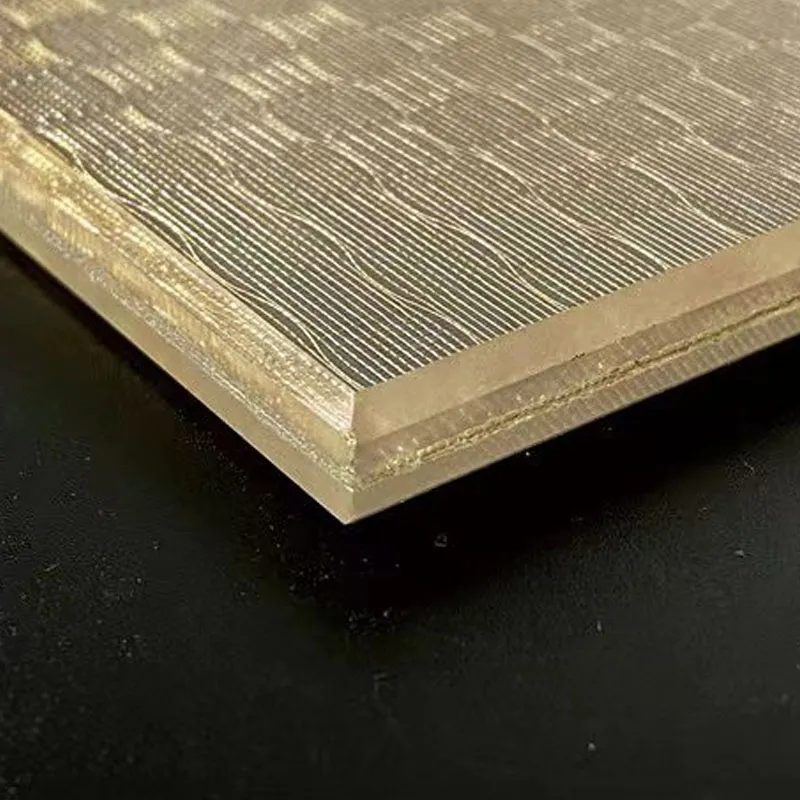Heat Treated Float Glass Properties, Applications, and Advantages
Heat treated float glass, also known as tempered glass, is an essential material in modern architecture and design. It is created by heating standard float glass to high temperatures, followed by rapid cooling. This process, known as tempering, imparts several beneficial properties to the glass, making it suitable for a wide range of applications. In this article, we will explore the properties, applications, and advantages of heat treated float glass.
Properties of Heat Treated Float Glass
The primary characteristic of heat treated float glass is its increased strength. The tempering process changes the internal structure of the glass, allowing it to withstand higher levels of stress compared to regular glass. Specifically, it can endure temperatures of up to 300-400 degrees Celsius without breaking. This thermal strength comes from the process of creating compressive stresses on the surface while tensile stresses occur internally, making the glass far less prone to shattering.
Another significant property of heat treated float glass is its safety quotient. When tempered glass breaks, it shatters into small, blunt pieces rather than sharp shards. This reduces the risk of injury, making it an ideal choice for various applications, especially in public spaces where safety is a priority.
Moreover, heat treated float glass has excellent thermal resistance. It can thermally handle temperature changes without cracking or warping, opening up new possibilities for architectural designs that incorporate large glass surfaces. This thermal stability also makes it suitable for applications such as facades and skylights, where it is exposed to direct sunlight and varying weather conditions.
Applications of Heat Treated Float Glass
Heat treated float glass is widely utilized across different sectors due to its unique properties. In the construction industry, it finds its place in buildings' facades, windows, and doors. Architects choose tempered glass not only for its aesthetic appeal but also for its ability to provide structural integrity and safety.
In commercial settings, heat treated float glass is frequently used in storefronts and display cases. The increased strength minimizes the risk of breakage, ensuring that products displayed in glass cases remain secure. Moreover, since tempered glass has a sophisticated optical clarity, it enhances the visibility of merchandise, attracting customers effectively.
heat treated float glass
In the automotive industry, heat treated float glass is used in the production of side windows and rear windows in vehicles. It is essential to employ tempered glass in areas that require durability to withstand impacts and environmental changes. This application helps enhance the overall safety of passengers while still maintaining visibility.
Additionally, in residential settings, heat treated float glass is commonly used for shower enclosures, balustrades, and interior partitions. Its exceptional strength and safety features make it an attractive choice for homeowners seeking stylish yet safe design solutions.
Advantages of Heat Treated Float Glass
The advantages of heat treated float glass extend beyond its safety and strength. One notable benefit is energy efficiency. The glass can be coated or tinted to reduce glare and heat transmission, helping to maintain indoor temperatures and reduce energy costs associated with heating and cooling.
Another advantage is its aesthetic versatility. Heat treated float glass is available in various thicknesses, colors, and finishes, allowing architects and designers to create unique and stylish environments. This aesthetic flexibility means it can cater to a wide range of design preferences, from modern minimalist to traditional styles.
Moreover, the handling and maintenance of heat treated float glass are relatively straightforward. Its smooth surface resists dirt and grime accumulation, making it easier to clean. Additionally, it is resistant to various environmental factors, which contributes to its longevity in outdoor applications.
Conclusion
In summary, heat treated float glass represents an advanced solution with numerous properties and applications that make it essential in today's construction, automotive, and design industries. Its strength, safety, thermal resistance, and aesthetic versatility provide unparalleled advantages. As technology continues to progress, the development of heat treated float glass is likely to evolve, opening new possibilities for innovative applications in various sectors. With its blend of function and form, heat treated float glass is set to remain a vital material for creators and builders for years to come.
 Afrikaans
Afrikaans  Albanian
Albanian  Amharic
Amharic  Arabic
Arabic  Armenian
Armenian  Azerbaijani
Azerbaijani  Basque
Basque  Belarusian
Belarusian  Bengali
Bengali  Bosnian
Bosnian  Bulgarian
Bulgarian  Catalan
Catalan  Cebuano
Cebuano  Corsican
Corsican  Croatian
Croatian  Czech
Czech  Danish
Danish  Dutch
Dutch  English
English  Esperanto
Esperanto  Estonian
Estonian  Finnish
Finnish  French
French  Frisian
Frisian  Galician
Galician  Georgian
Georgian  German
German  Greek
Greek  Gujarati
Gujarati  Haitian Creole
Haitian Creole  hausa
hausa  hawaiian
hawaiian  Hebrew
Hebrew  Hindi
Hindi  Miao
Miao  Hungarian
Hungarian  Icelandic
Icelandic  igbo
igbo  Indonesian
Indonesian  irish
irish  Italian
Italian  Japanese
Japanese  Javanese
Javanese  Kannada
Kannada  kazakh
kazakh  Khmer
Khmer  Rwandese
Rwandese  Korean
Korean  Kurdish
Kurdish  Kyrgyz
Kyrgyz  Lao
Lao  Latin
Latin  Latvian
Latvian  Lithuanian
Lithuanian  Luxembourgish
Luxembourgish  Macedonian
Macedonian  Malgashi
Malgashi  Malay
Malay  Malayalam
Malayalam  Maltese
Maltese  Maori
Maori  Marathi
Marathi  Mongolian
Mongolian  Myanmar
Myanmar  Nepali
Nepali  Norwegian
Norwegian  Norwegian
Norwegian  Occitan
Occitan  Pashto
Pashto  Persian
Persian  Polish
Polish  Portuguese
Portuguese  Punjabi
Punjabi  Romanian
Romanian  Russian
Russian  Samoan
Samoan  Scottish Gaelic
Scottish Gaelic  Serbian
Serbian  Sesotho
Sesotho  Shona
Shona  Sindhi
Sindhi  Sinhala
Sinhala  Slovak
Slovak  Slovenian
Slovenian  Somali
Somali  Spanish
Spanish  Sundanese
Sundanese  Swahili
Swahili  Swedish
Swedish  Tagalog
Tagalog  Tajik
Tajik  Tamil
Tamil  Tatar
Tatar  Telugu
Telugu  Thai
Thai  Turkish
Turkish  Turkmen
Turkmen  Ukrainian
Ukrainian  Urdu
Urdu  Uighur
Uighur  Uzbek
Uzbek  Vietnamese
Vietnamese  Welsh
Welsh  Bantu
Bantu  Yiddish
Yiddish  Yoruba
Yoruba  Zulu
Zulu 

